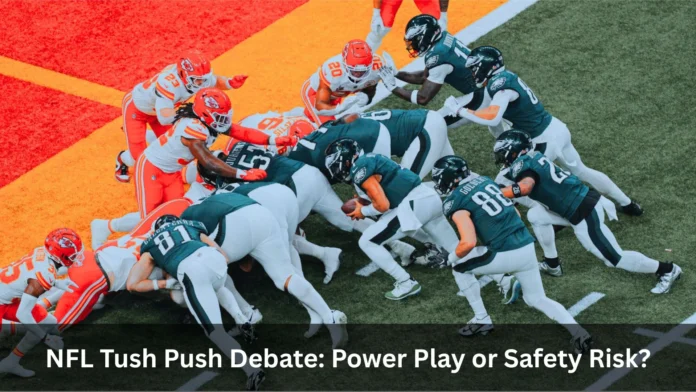Key Takeaways
- NFL tush push debate is centered on whether this quarterback sneak tactic is a legitimate strategy or a dangerous loophole that should be banned.
- Some teams, led by the Green Bay Packers, argue that the play lacks skill and poses safety risks.
- The Philadelphia Eagles’ mastery of the move has intensified calls for rule changes—sparking a divide among teams.
- Despite concerns, there’s no conclusive data showing that the tush push increases injury risk.
- The proposed ban, which needs the consent of 24 out of 32 teams, will be put to a vote by NFL owners.
The Tush Push Controversy: A Collision of Power, Performance, and Policy
In a league built on speed, strategy, and spectacle, one gritty and controversial play has become a lightning rod for debate: the tush push. NFL owners are debating league rules and procedures during a two-day meeting, and the lowly but incredibly successful move is in the spotlight—possibly making its last fight.
But what is it about this play that has fans divided, coaches conflicted, and teams scrambling for a rulebook rewrite?
What Exactly Is the Tush Push?
The tush push, often dubbed a “rugby-style quarterback sneak,” sees the quarterback take a direct snap with several teammates immediately pushing him from behind to gain critical short yardage—usually on third or fourth down with inches to go.
It’s a play the Philadelphia Eagles have not only popularized but nearly perfected, using it consistently during their Super Bowl run. In the trenches, it’s brute-force football. To critics, it’s a glitch in the system. To fans and strategists, it’s just good execution.
The Root of the Uproar: Dominance Breeds Controversy
The Eagles’ mastery has ignited a league-wide outcry—not because the play is flawed, but because it’s too effective. That very dominance is what’s sparking a call for reform. According to Jeff Miller, NFL’s executive vice president of communications and policy, the real question is: “Is it fair to punish one team just because they execute the play better than others?”
The Green Bay Packers don’t think so. They have officially suggested that the tush push be completely prohibited. Their argument? It’s neither athletic nor skill-based, and it dangerously flirts with automatic first downs.
In the words of Packers President Mark Murphy:
“There’s no skill involved. It’s bad for the game. We should return to the traditional quarterback sneak without runner assistance.”
Safety vs Spectacle: Where’s the Data?
The play’s safety record is murky. Despite its physical appearance, there’s no hard data showing the tush push leads to more injuries than standard plays. Even NFL Commissioner Roger Goodell admitted that the injury risk is more speculative than evidence-based.
Yet, the league’s cautious posture remains puzzling—especially since they continue to promote kickoff returns, which are statistically among the most injury-prone sequences in football. The double standard is not lost on fans or sports journalists.
As USA Today put it:
“If the NFL is worried about safety, then banning a play with no proven injury history while encouraging more kickoffs is logically inconsistent.”
Is It Football or Is It Gaming the System?
Opponents argue that the tush push is an exploitation of the rules—akin to a cheat code. But supporters liken it to chess within chaos—a clever use of power and precision. The play demands synchronicity, core strength, and absolute trust between linemen and quarterback.
Moreover, isn’t creativity at the core of football’s evolution? From the Wildcat formation to the flea-flicker, innovation has always clashed with orthodoxy. This is no different.
Who’s for the Ban and Who’s Not?
The final verdict rests on a vote from NFL team owners. For the rule change to be approved, at least 24 of the 32 teams must agree with it. As of now, many teams remain on the fence, while some have spoken passionately in favor of preserving the play.
The Eagles, unsurprisingly, have defended their right to use the tush push, claiming excellence should not be legislated against. They’re backed by analysts who argue the NFL is becoming overly sanitized, stripping away physicality that defined the sport.
“This is football. Let’s not turn it into a game of flags and flourishes,” wrote one former coach in an op-ed for The Athletic.
A Glimpse into the Future: Olympic Flag Football & Tush Push Irony
Interestingly, this rule review comes at a time when the NFL is also debating whether to allow players to participate in flag football during the 2028 Summer Olympics. The juxtaposition is striking—on one hand, the league flirts with non-contact versions of football; on the other, it debates outlawing a physical but arguably safe play.
The irony hasn’t gone unnoticed. As NBC Sports quipped: “The NFL worries about what might happen with the tush push while embracing what does happen during kickoffs.”
Conclusion: Evolution or Elimination?
The tussle over the tush push is more than a playbook dispute—it’s a reflection of the NFL’s identity crisis. As the league balances entertainment, safety, and tradition, each rule change becomes a litmus test for what the future of football should look like.
Should a play be banned simply for being too successful? Or should others rise to the challenge and innovate around it?
Whether the tush push survives or is sacked, one thing is clear: its legacy as one of the most debated plays in recent NFL history is already etched in the rulebooks and locker room debates.


